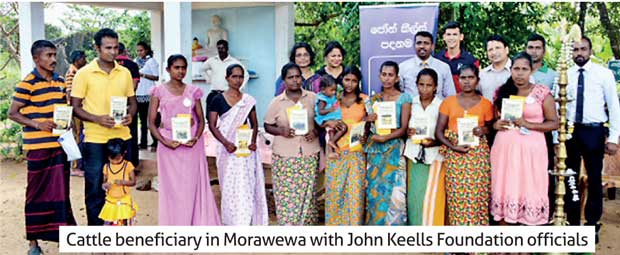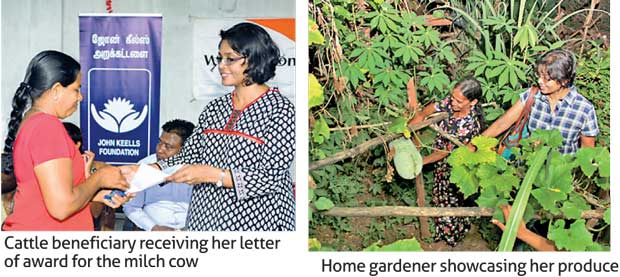08 Mar 2016 - {{hitsCtrl.values.hits}}

The International Women’s Day commemorated globally on March 8 is a time to reflect on progress made, to call for change and to celebrate acts of courage and determination by ordinary women who have played an extraordinary role in the history of their countries and communities. Worldwide, women continue to contribute to social, economic, cultural and political achievement.
The 2016 theme for International Women’s Day is ‘Planet 50-50 by 2030: Step it up for gender equality’. While certain strides have been made towards achieving gender parity, progress has been slow in many places. The World Economic Forum predicted in 2014 that it would take until 2095 to achieve global gender parity. In 2015, they estimated that a slowdown in the already glacial pace of progress meant the gender gap wouldn’t close entirely until 2133.
Gender empowerment is a cross-cutting theme of the social responsibility initiatives of John Keells Foundation - the corporate social responsibility (CSR) entity of the John Keells group. Whilst all projects and initiatives implemented by the foundation are aligned with the group’s CSR vision of ‘Empowering the nation for tomorrow’, a key consideration is supporting the empowerment of those most vulnerable – women and children.
The foundation’s Village Adoption Project is a key initiative aimed at poverty alleviation at village level through a sustainable and integrated development programme planned and implemented in partnership with relevant stakeholders. The project includes providing access to basic needs such as water, electricity and education, development of sustainable and diversified livelihoods and income generation, entrepreneurship and markets access, water and sanitation, gender and youth empowerment activities including skills development and capacity building. Villages ‘adopted’ thus far include Halmillewa in the Anuradhapura District, Mangalagama in the Ampara District, Iranaipalai (of Puthukkudiyiruppu DS) and Puthumathalan (of Maritimepattu DS) in the Mullaitivu District and Morawewa South GN in the Trincomalee District.
With many of these villages comprising female-headed households as a direct and indirect impact of long years of conflict, John Keells has identified the need to promote and equip women with basic facilities, knowledge and skills to be socially and economically independent. In each of the villages, a women’s organisation has been established as a platform for women to collectively work together towards promoting the social, economic, cultural and political wellbeing of their community and themselves, acquire essential skills and knowledge towards empowering them socially and economically, forge partnerships for commercial enterprises and discuss and resolve community issues towards achieving peace and justice.

The foundation has acted as an enabling partner by supporting the women’s organisations in raising seed capital, facilitating basic needs such as access to water and electricity, enhancing awareness on critical aspects such as health and nutrition, saving and book-keeping and building capacity through initiatives such as sewing, rug-making, fabric painting, home-gardening and mushroom cultivation.
On February 25 and 26, 2016, the John Keells Foundation initiated a livestock project in its Northern and Eastern villages, commencing with the donation of 20 heads of cattle in Mullativu and 10 heads of cattle in Morawewa, with a focus on female-headed households. The beneficiaries who were selected by the respective women’s organisations were also given training on cattle rearing and the process of milk collection. Market linkages with grass root organisations such as Milco in Morawewa and UNDP in Mullativu have also been established to facilitate the process of milk collection.
Speaking during the handover of milch cows, one of the beneficiaries in Iranaipalai in Mullaitivu, Nyanasir Erandavaraani said, “I am very thankful to John Keells for providing me with this cow. I can use the cow to provide for my family as well as use the excess milk to earn an income. Even though we did not ask for help, John Keells has done a great deed in empowering me and the community.”
Meanwhile, the home garden competition in Halmillewa is in progress for the fourth successive year with the majority of participants being women. It has proven to be a successful initiative in generating an additional source of income for the participants while providing an economical and nutritious diet for their families. Chandra Kumari Sagarika, a repeat participant in the home garden competition commented, “I am still reaping the fruits of the last harvest. The income received from selling the extra produce helped us to settle our electricity and water bills.”
Sagarika, who also plays an active role in the Diriyen Idiriyata women’s organisation in the village, further claimed, “Since the women’s organisation continues to stay strong, the women are less dependent on their husbands. More importantly, we don’t consider ourselves to be less privileged anymore due to the support rendered by John Keells that has helped us stand on our own two feet.”
Moreover, the higher education of girls and women is encouraged through the foundation’s Higher Education Scholarship Scheme through which monthly grants are provided to applicants who are eligible for Advanced Level and university education. A total of 14 rural women are currently benefiting under this scheme.
Head of Operations-CSR Carmeline Jayasuriya said, “At John Keells we believe in empowering and creating shared value among all our stakeholders. As such, we believe our wide-ranging gender empowerment initiatives are not only beneficial to women but are essential for the holistic and sustainable development of our communities and country. Given the crucial role of women in the family and community, we will continue our efforts to facilitate their social and economic development towards building a more inclusive and sustainable future.”
29 Nov 2024 7 hours ago
29 Nov 2024 8 hours ago
29 Nov 2024 9 hours ago
29 Nov 2024 29 Nov 2024
29 Nov 2024 29 Nov 2024